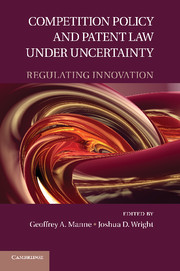Book contents
- Frontmatter
- Contents
- Contributors
- Introduction
- PART I THE INSTITUTIONS OF GROWTH
- PART II THE ECONOMICS OF INNOVATION
- PART III INNOVATION AND COMPETITION POLICY
- PART IV THE PATENT SYSTEM
- PART V PROPERTY RIGHTS AND THE THEORY OF PATENT LAW
- PART VI INTELLECTUAL PROPRETY AND ANTITRUST: THE REGULATION OF STANDARD-SETTING ORGANIZATIONS
- 15 Increments and Incentives
- 16 What's Wrong with Royalties in High-Technology Industries?
- 17 Federalism, Substantive Preemption, and Limits on Antitrust
- Index
- References
16 - What's Wrong with Royalties in High-Technology Industries?
Published online by Cambridge University Press: 05 June 2012
- Frontmatter
- Contents
- Contributors
- Introduction
- PART I THE INSTITUTIONS OF GROWTH
- PART II THE ECONOMICS OF INNOVATION
- PART III INNOVATION AND COMPETITION POLICY
- PART IV THE PATENT SYSTEM
- PART V PROPERTY RIGHTS AND THE THEORY OF PATENT LAW
- PART VI INTELLECTUAL PROPRETY AND ANTITRUST: THE REGULATION OF STANDARD-SETTING ORGANIZATIONS
- 15 Increments and Incentives
- 16 What's Wrong with Royalties in High-Technology Industries?
- 17 Federalism, Substantive Preemption, and Limits on Antitrust
- Index
- References
Summary
Introduction
Over the past few years, there has been an unprecedented degree of interest among competition authorities, scholars, legal practitioners, industry analysts, and trade associations with respect to the level of royalties that are charged by holders of intellectual property rights (IPRs), especially when their patents are essential to an industry standard.
In particular, the last couple of years saw a lot of action on the antitrust front in the United States and Europe. The U.S. Federal Trade Commission (FTC) adopted a decision in which it found that by concealing its ownership of certain patents, Rambus persuaded the members of JEDEC, a standard-setting organization (SSO), to adopt two standards for computer memory (SDRAM and DDR SDRAM) incorporating those patents that, in turn, significantly contributed to Rambus's unlawful acquisition of monopoly power. The remedy imposed by the FTC consisted in imposing a cap on the level of royalty rates that could be charged by Rambus to the firms needing access to its technology to implement the standards in question. This decision was, however, reversed in April 2008 by the U.S. Court of Appeals for the District of Columbia Circuit. In the two years preceding, the U.S. Department of Justice (DoJ) granted business letter clearances to two SSOs – VITA and IEEE – to implement new IPR policies essentially designed to control the IPR costs for the standards they promulgate.
- Type
- Chapter
- Information
- Competition Policy and Patent Law under UncertaintyRegulating Innovation, pp. 462 - 478Publisher: Cambridge University PressPrint publication year: 2011
References
- 1
- Cited by



